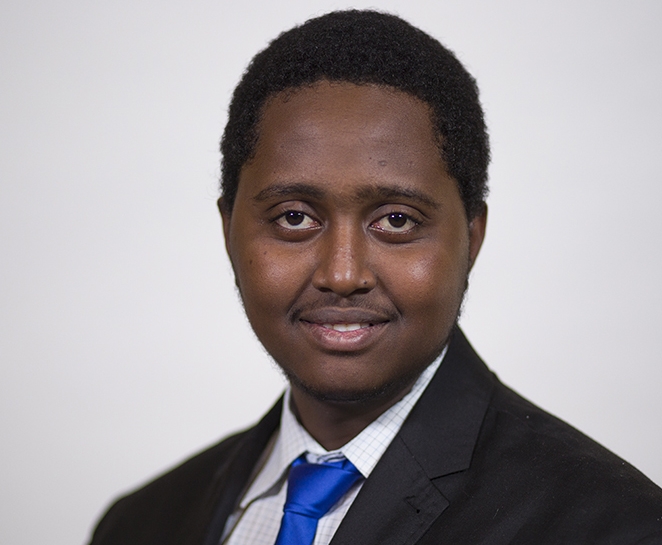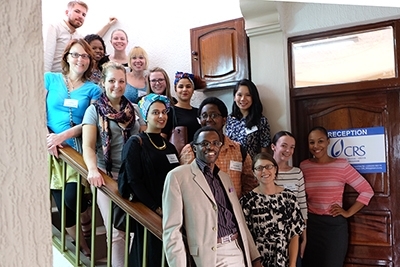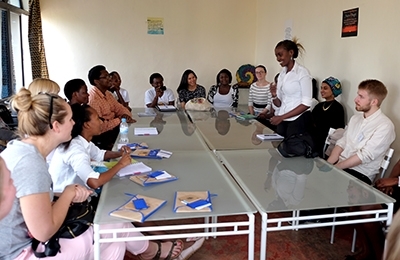Dispatch from Rwanda

MIDDLEBURY, Vt. – Armel Nibasumba grew up in Burundi just south of Rwanda with poverty, strife, and ethnic tension all around him. This month the Middlebury College junior is back in East Africa to study project management for international development and social change with a group from the Middlebury Institute of International Studies at Monterey.
Nibasumba, 22, is no stranger to managing projects to help rebuild his region of Africa. He received a Center for Social Entrepreneurship grant his first year at Middlebury to conduct peace-keeping workshops in Burundi, and last summer he launched the Twese for Peace National Camp Project in Burundi with a $10,000 Davis Fellowship for Peace. A biochemistry major, Nibasumba plans to become a doctor.
Here, in Nibasumba’s own words and pictures, is the first of a series of dispatches from Rwanda:
“I am currently in Rwanda where I am attending DPMI, a certificate-based professional training program from the Middlebury Institute of International Studies at Monterey. Training will last three weeks and is taught by Dr. Beryl Levinger, distinguished professor and chair of the Development Practice and Policy Program at MIIS where she has served since 1992.

pmi2-400.jpg” border=”0” width=”400” height=”267” />
“This week, a group of 12 students from Middlebury College, MIIS, and other higher-learning institutions participated in an immersion program held in Kigali, the capital city of Rwanda. This program was designed to help the participants discover Rwanda through its rich history, politics, and people, and give them a cultural context that will be crucial for the work we will do in the upcoming weeks.
“We have met with the Minister of Agriculture, Minister of Youth and ICT, the National Unity and Reconciliation Commission, the National Commission for the Fight Against Genocide, the Ministry of Health, and the Parliament of Rwanda – all to hear more about Vision 2020, a strategic plan aimed to make Rwanda a middle-income country by 2020. We also visited various NGOs such as the Akilah Institute for Women, the Catholic Relief Service, Les Enfants de Dieu, the Gurl Hub, and the Akazi Kanoze Project to learn how some development projects have made Rwanda such a success story.
“We visited the Genocide Memorial to understand how the 1994 genocide against the Tutsi was planned and implemented. It was very moving but it also left me wondering how much we have learned as humans since genocides still occur today with recent examples in Iraq, Darfur, Myanmar, and other parts of the world. This past weekend we went down south in Butare close to the border with Burundi to visit the National Museum of Rwanda and the King’s Palace in Nyanza to learn about the wealth and depth of Rwandan history. Sadly, most people start looking at Rwandan history only after the terrible genocide against the Tutsi of 1994. Last weekend’s visits to historical sites was a great reminder that it is not right to reduce centuries of culture and civilization of a group of people to a single story inspired by an event that lasted only three months. Marie Kagaju Laughan, a Rwandese American, facilitated our immersion program and enabled us to put things into perspective to understand better the country and its culture. We are getting prepared for the next two weeks that we will spend in Rwinkwavu, in eastern Rwanda, studying and doing client-based work at Partners in Health.

pmi-1-400.jpg” border=”0” width=”400” height=”260” />
“Today, Rwanda rhymes with resilience, breath-taking beauty, and unbreakable strength. Although I am no stranger to Rwanda and its culture and politics, I have been exposed to so much information that made me think about how far the country has come and where it is headed. We have learned about the forces that made Rwanda an example for third-world countries in community development, good governance, and its ability to rise from ashes. I feel privileged to have spoken with government officials that I would normally see on TV, and very inspired about their sense of accountability, their performance-focused work, and their patriotism.
“Since I speak the local language, I took pleasure in being an ambassador to help the other participants gain a better understanding of the culture. (I took great caution to avoid being too overbearing.) What I have enjoyed the most is having in-depth conversations about world politics and social entrepreneurship. Learning about the life experiences of the other people in my group has filled me with so much appreciation for all the participants. My biggest take away from this week was summed up in Carl Wilkens’ words from last Thursday’s presentation. He said, ‘It’s important to define yourself by what you have left and not by what was taken from you. It’s what you do next that is important.’”
Armel Nibasumba ‘16 will file more dispatches from Rwanda this month, and will return to Middlebury in February for the spring semester. He was profiled by the Associated Press in December 2014.
– Rwandan photographs by Anissa Bensaid

